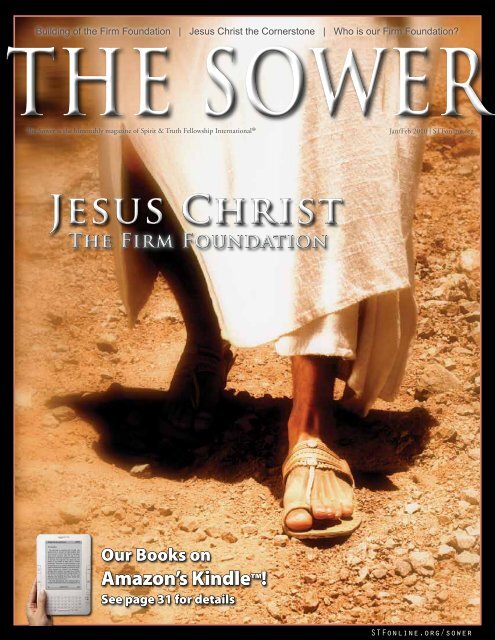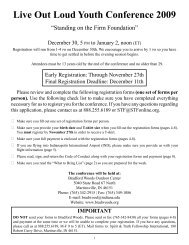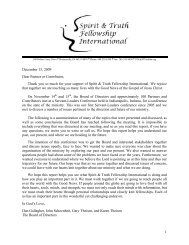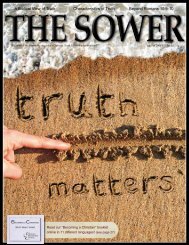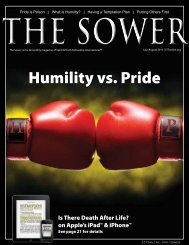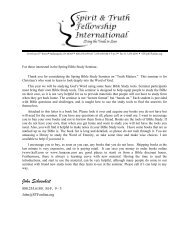Jesus Christ: The Firm Foundation - Spirit & Truth Fellowship ...
Jesus Christ: The Firm Foundation - Spirit & Truth Fellowship ...
Jesus Christ: The Firm Foundation - Spirit & Truth Fellowship ...
Create successful ePaper yourself
Turn your PDF publications into a flip-book with our unique Google optimized e-Paper software.
Read online at <strong>Truth</strong>OrTradition.com/firmDo not merely listen tothe word, and sodeceive yourselves.Do what it says.James 1:22Jan/Feb 2010 <strong>The</strong> Sower 5
Share this article online at <strong>Truth</strong>OrTradition.com/firmof a construction project is found inthe preplanning of the details andspecifications. No contractor can beexpected to deliver to the ownerwhat he or she desires if they do notcommunicate their “wants” up front.God knew what He wanted and Hecommunicated it to Moses; then it wasMoses’ responsibility to make sure ithappened. In a similar manner, Godhas communicated to us through <strong>Jesus</strong>His desire for the type of building weare to construct.1 Peter 2:4 and 5(4) As you come to him, the livingStone—rejected by men butchosen by God and precious tohim—(5) you also, like living stones, arebeing built into a spiritual houseto be a holy priesthood, offeringspiritual sacrifices acceptable toGod through <strong>Jesus</strong> <strong>Christ</strong>.He has clearly communicated tous the building plans and given usthe tools and materials with whichto build. God and <strong>Jesus</strong> have donetheir part, now it is up to us to doours. When we put <strong>Christ</strong>’s words intopractice we are building upon thefirm “foundation of the apostles andprophets, with <strong>Christ</strong> <strong>Jesus</strong> himself asthe chief cornerstone” (Eph. 2:20).When the Israelites had finishedbuilding the Tent of Meeting, Mosesinspected their work and blessed itbecause they had done the work justas Yahweh had commanded (Exod.39:42). In the same way, we have theresponsibility to build just as our Lordhas commanded us. We begin byestablishing <strong>Christ</strong> as our foundationwhen we make him our Lord. 3 We thenbuild upon a solid foundation whenwe transform ourselves by puttingon his character, which is the pursuitof holiness. We erect a lasting edificewhenever we discipline ourselvesto live like <strong>Christ</strong>, according to God’sways, not the ways of the world. Weall sin, and when we do we should bequick to repent and confess our sin.And when others sin against us, wecannot be grudge-holders, but ratherwe must extend forgiveness, gettingrid of all malice and bitterness. Wemust first know the way of our Father,learning His words, and then have thecharacter and courage to do them.<strong>The</strong>n we can be the heart of God to aspiritually malnourished world.Every loving act we do addsanother enduring piece to ourmasterfully erected building. Somebuildings are made out of weakmaterials and will not last. Let’s makesure that through our godly wordsand deeds we employ the highestquality materials. When we do, wehave the promise that what we buildwill last, because we are Building Uponthe <strong>Firm</strong> <strong>Foundation</strong>.Endnotes:1. Matthew 6:19-20: “Do not store up foryourselves treasures on earth, where mothand rust destroy, and where thieves breakin and steal. But store up for yourselvestreasures in heaven, where moth and rust donot destroy, and where thieves do not breakin and steal.”; 1 Peter 1:3-4: “Praise be to theGod and Father of our Lord <strong>Jesus</strong> <strong>Christ</strong>! Inhis great mercy he has given us new birthinto a living hope through the resurrectionof <strong>Jesus</strong> <strong>Christ</strong> from the dead, and into aninheritance that can never perish, spoil orfade–kept in heaven for you…”2. Scholars have noted that the Bible mustnot contain all of the information necessaryfor building the Tent of Meeting, but it isclear from Exodus that God gave the detailsto Moses.3. Romans 10:9 and 10: “That if you confesswith your mouth, “<strong>Jesus</strong> is Lord,” and believein your heart that God raised him from thedead, you will be saved. For it is with yourheart that you believe and are justified, andit is with your mouth that you confess andare saved.”<strong>Truth</strong>OrTradition.com/iphoneWe now have an iPhone-optimizedwebsite thatputs Bible-basedteachings in thepalm of your hand!Whether you areon the go or havinga Bible study, wecan help you findanswers to life’stough theologicalquestions.Check it out at<strong>Truth</strong>OrTradition.com/iphoneYouTube VideoTeachingsNew ways to watchAt <strong>Spirit</strong> & <strong>Truth</strong> <strong>Fellowship</strong>, we want tomake the Word of God real and livingin people’s lives. That is why we havemade over 100 short YouTube videoteachings over the last 7 months.We believe that everyone has time fora 10-minute long Bible teaching, nomatter how busy life gets. <strong>The</strong>y aregreat for early morning quiet times tostart the day off right. Here are fourdifferent ways you can watch thesevideos:Subscribe in iTunesWe have a brand new Video Podcastavailable in iTunes! You can subscribeto the podcast and have new teachingsautomatically downloaded to yourcomputer. Now you can sync themto your iPod or iPhone for viewingon the go. Subscribe today at<strong>Truth</strong>OrTradition.com/itunesMac OS X Video WidgetIf you have a Mac computer, youcan watch our latest videos right onyour Dashboard with our new VideoWidget. Every time we upload a newone, it will automatically update onthe widget. Get the widget now at<strong>Truth</strong>OrTradition.com/videowidgetOn our YouTube ChannelWatch our Videos all in one placeonline in our own YouTube Channel.<strong>The</strong>re are just about 100 videos tochoose from, with a variety of topics.<strong>Truth</strong>OrTradition.com/youtubeOn a YouTube enabled phoneIf you have cell phone that can playYouTube videos (Windows Mobile,Symbian S60, iPhone, Android, PalmPre, etc.) then you have access to ourteachings wherever you go. Go to<strong>Truth</strong>OrTradition.com/youtube inyour mobile browser to check themout!Jan/Feb 2010 <strong>The</strong> Sower 7
8 <strong>The</strong> Sower Jan/Feb 2010
<strong>Christ</strong>ian Appalachian ProjectMission Trip Summary - By Joshua Albus<strong>Christ</strong>ian Appalachian Project (CAP)is an interdenominational <strong>Christ</strong>ianorganization that serves the people livingin the 400 counties which constitute theAppalachia region.This past summer, I (JoshuaAlbus) went on a mission tripwith six others to Kentuckyto volunteer for the <strong>Christ</strong>ianAppalachian Project (CAP). It was a veryenjoyable and rewarding experience!CAP is an interdenominational<strong>Christ</strong>ian organization that serves thepeople living in the 400 counties whichconstitute the Appalachia region.One-fourth of those counties areconsidered distressed. CAP provides forthose in need of physical, spiritual, andemotional support via several differentavenues. One of those avenues is homerepair and renovation for those whocannot afford the repairs. That is whatwe did for one week.We helped an elderly widow. Herroof leaked in multiple areas and herwindows were allowing too much heatto leave her house. <strong>The</strong> siding wasfalling apart, and the house had a lot ofwater and dry rot damage.Our service to her was fixing andreplacing those items. While wewere blessing her, we ourselves werebeing blessed; of course, I am takinga measure of liberty to speak foreveryone else based upon words ofpraise and thanks spoken every night.It is rewarding to give to others formore reasons than I can go into here.Acts 20:35b says, “It is more blessed togive than to receive.” Proverbs 11:25(ESV) says, “Whoever brings blessingwill be enriched, and one who waterswill himself be watered.” That is why itwas a blessing to serve her. Although Icut open my hand on a piece of metalWatch the Video online at STFonline.org/missiontrip(I should have been wearing gloves)and was soaked in sweat and coveredin a layer of grit at the end of every day,it was all worth it to see the joy on herface.<strong>The</strong> work environment was alsocompletely different from any workenvironment in which I have everbeen before. My past work experiencehas been in both construction andoffice settings, but none of themhas ever been as encouraging anduplifting as volunteering in this typeof environment. No swearing or crudejokes occurred here, and everyonewas patient and helpful. <strong>The</strong>y did notinsult or look down upon anyone forlack of knowledge. It was amazing! I amthrilled that I went on the mission trip.It was awesome and such a blessing tome!As I end this article, I want toencourage you to join us June 6th –11th, 2010 for our next CAP missiontrip. You will bless others, and youwill be blessed by it. You never knowwhat God can show you. Constructionexperience is not a requirementor necessary to participate. I alsoencourage you to invite anyone,regardless of their beliefs, because thegoal is serving others. As will oftenhappen in our busy lives, the timethat the mission trip is scheduled maynot allow for you to participate, butthat does not mean that you cannotparticipate in the service to others. Itis always available for all of us to serveothers by giving financially when weare not able to give of our time. If youare not able to come, it would be ablessing if you could donate to our CAPMission Trip Scholarship Fund so otherswho want to go but are financiallyunable can participate. God bless you!Mission Trip Promo VideoTo get a better idea of whatour last mission trip was like,check out our Mission TripPromo Video atSTFonline.org/missiontripFor more info on our June 6th-11th, 2010 trip, see STFonline.org/registeror call us toll free at 1.888.255.6189, M-F 9 to 5 (ET).Jan/Feb 2010 <strong>The</strong> Sower 9
THE CONTENDER“...I felt I had to write and urge you to contend for the faith that was once for all entrusted to the saints” (Jude 3)10 <strong>The</strong> Sower Jan/Feb 2010
Available online at<strong>Truth</strong>OrTradition.com/foundationJust over 2000 years ago the great ApostlePaul wrote by revelation that <strong>Jesus</strong> <strong>Christ</strong>was the foundation for every <strong>Christ</strong>ianlife, and no one could lay any otherfoundation than him (1 Cor. 3:11). He alsosaid that each of us “should be careful how hebuilds” (1 Cor. 3:10). Every builder knows howimportant the foundation of any project is.When it comes to our <strong>Christ</strong>ian life, however,our “foundation” is even more important thanthe foundation of a building because <strong>Jesus</strong> isnot only our foundation, but our example. <strong>The</strong>more we know about <strong>Jesus</strong>, the clearer we willbe about what and how to build our lives as<strong>Christ</strong>ians. One of the most important waysthat God has chosen to reveal His Son is by thenames and descriptions that are given of himin the Bible.Defining the Terms<strong>The</strong> name of our Savior, “<strong>Jesus</strong>,” and the titlesand appellations that the Word of God uses todescribe him, are very helpful in understandingboth the man himself and his mission, andalso how to live as <strong>Christ</strong>ians. Before we beginto delve into some of the names and titles ofb y J o h n W . S c h o e n h e i t<strong>Jesus</strong>, however, it greatly helps if we definethe terms we will be using. Although the word“name” is used in different ways, properly andmost usually, a “name” is a word or words whichare given to a person close to the time he orshe is born and by which he or she will beknown in society. We refer to this as a “propername,” in contrast to an “appellation,” “title,” or“description,” which we will define below. Thisarticle will focus on some of the names andappellations of <strong>Jesus</strong>, and thus will deal withnames that are Semitic in nature. Althougha full article on the names in the Bible wouldhave to cover the customs involving Greek andRoman names, we do not do that in this article.Proper NamesProper names are constructed differentlyin different cultures. Typically in Americanculture, a baby is given a “first name” andoften a “middle name,” and retains the “familyname” or “last name” as the last part of his orher “full name.” Thus, my first name is Johnand my middle name is William, both of whichwere names of my ancestors. My “last name” isSchoenheit, which is an Americanized spellingJan/Feb 2010 <strong>The</strong> Sower 11
THECONTENDERof the German name that has comedown to me from my distant ancestors.In our Western culture, the “last name”typically continues generation aftergeneration and families are recognizedby the “last name” (sometimes referredto as the “given name”). Hebrew culturetreated names differently. <strong>The</strong>re was no“last name” that was passed on fromone generation to the next. Usuallya Hebrew man or woman had one“name.” Of course, many people hadthe same name. Thus, for example,there are nine people called “Amariah”in the Bible, twelve called“Hananiah,” and eightcalled “Jehoram.”To alleviate anyconfusion as to whowas being referred toby any specific name, itwas common in Semiticculture for people toclarify who they wereby using the name oftheir father as a “lastname.” Most studentsof the Bible are familiarwith King David, whosefather was Jesse. Davidis called “David son ofJesse” in the Bible (2 Sam.23:1), but calling himthat sounds more like adescription than a name.However, there is no “the”in the Hebrew text, and Young’s LiteralTranslation is correct in translating thephrase, “David son of Jesse.” <strong>The</strong> Hebrewis simply “David ben Jesse,” whichwas David’s “full name.” Solomon’s fullname was “Solomon son of David”(Solomon ben David; 1 Chron. 29:22).Similarly, the full name of Solomon’sson Rehoboam was “Rehoboam son ofSolomon” (Rehoboam ben Solomon).It was the same for women as for men.For example, although most Englishversions refer to Dinah as “the daughterof Jacob,” the Hebrew text simply refersto her as “Dinah daughter of Jacob”(Dinah bat Jacob; Gen. 34:3). 1An interesting biblical study is tonote when people are called by their“full names.” Around the house, I usuallycalled my son “Sam” unless he was introuble, then I would call him, “SamuelSchoenheit.” We all know that whensomeone calls us by our full name,something serious is happening. That isusually the case in the Bible, too. AfterPeter had denied <strong>Jesus</strong>, <strong>Jesus</strong> needed tohave a serious talk with him, so he said,“Simon son of John…” (John 21:15). 2Peter knew in an instant by the way<strong>Jesus</strong> addressed him that this was goingto be a serious talk. First, <strong>Jesus</strong> calledhim by his birth name, Simon. When<strong>Jesus</strong> had first met Peter, he changedhis name from Simon to “Cephas,” whichis the Aramaic form of the Greek name,“Peter” (John 1:42). However, in thisDID YOU KNOW?• In the Hebrew culture no “last name” or “familyname” continued generation after generation.If a person was not familiar with the family, bythe third generation any direct connection toancestors by name was lost.• It was common for people to be very aware of thenames that had been used by their ancestors. Alsothey would use those names over and over again.• It was common in Semitic culture for people toclarify who they were by using the name of theirfather as a “last name” (e.g. “David son of Jesse”).serious moment, <strong>Jesus</strong> refers to Peter as“Simon ben John,” his full birth name. 3<strong>Jesus</strong> is only called by his “full name”one time in the Bible, and that was bythe Jews who were confused by whathe was saying (John 6:42; compare toJohn 1:45, which is close).Since in the Hebrew culture no“last name” or “family name” continuedgeneration after generation, if a personwas not familiar with the family, by thethird generation any direct connectionto ancestors by name was lost.<strong>The</strong>refore it was common for people tobe very aware of the names that hadbeen used by their ancestors, and usethose names over and over. Thus, whenZachariah and Elizabeth were going toname their baby “John” (the Baptist),there was much concern among familymembers, who pointed out, “<strong>The</strong>re is noone among your relatives who has thatname” (Luke 1:61).Since the identity of the family linewas not passed down in the name,it was also quite common amongHebrews that people were “named” byother things, such as where they camefrom. Some good examples are MaryMagdalene, who was from the townof Magdala in Naphtali, Abishag theShunammite (1 Kings 1:3), who wasfrom Shunem in Issachar, or Uriah theHittite, whose ancestors were Hittites.<strong>The</strong> Bible contains about 1400individual names, and demonstrates thewide variety of subjectschosen by parents asnames. Names that camefrom nature includeDeborah (bee), Rachel(ewe), and Jonah (dove).Names that refer tophysical characteristicsinclude Edom (red) andHakkatan (small one).Many names reflecteda hope or wish, or somecircumstance in theparent’s life at the time.<strong>The</strong> sons of Jacob fitthat category very well.“Reuben” the firstbornson of Leah, the lessloved wife, means,“Look, a son.” Her secondson, “Simeon” means“hearing,” for she said that Yahwehheard she was “hated” (loved less) andso He gave her a second son. 4 Anothercommon practice in Hebrew culturewas the “sentence name,” in which thename itself was compound and madeinto a sentence. “Abraham” means“Father of a multitude,” “Elimelech”means “God is king,” and Hosea namedone of his children, “Loammi,” whichmeans “Not my people” to show God’srejection of Israel due to their sin.Appellation, Title, andDescriptionIn contrast to a “proper name,”an “appellation” is a designation oridentifying “name,” by which someoneis known, due to some circumstanceor characteristic. Calling <strong>Jesus</strong> <strong>Christ</strong>“Immanuel” is a good example. It was12 <strong>The</strong> Sower Jan/Feb 2010
Jan/Feb 2010 <strong>The</strong> Sower 13
THECONTENDERnot <strong>Jesus</strong>’ “proper name,” but is anappellation, a designation by whichhe is known (Isa. 7:14; Matt. 1:23).In our common English vernacular,when we use the word “name” weinclude appellations, even though anappellation is not a “proper name.” A“title” is a type of appellation, markingsome honor, dignity, or distinctiondue to something such as rank(Admiral), office (Mr. President), orattainment (Dr.). Titles are often usedin conjunction with the name, but donot have to be (Archbishop Smith; SirHillary; Queen Elizabeth). “Lord,” whichwe use today of <strong>Jesus</strong> <strong>Christ</strong>, was acommon title in both the Hebrewculture (“adon”) and the Greco-Romanculture (“kurios”).In contrast to a “name” or“appellation,” a “description” is verbalrepresentation of the person focusingon an attribute or attributes. Forexample, when the Messiah is referredto as “a man of sorrows” (Isa. 53:3), or“that great Shepherd of the sheep”(Heb. 13:20), he is being described,not technically “named.” However,sometimes the difference betweena name and short description getsso blurred that it is hard to tell thedifference between them. For example,when John the Baptist saw <strong>Jesus</strong>, hesaid to his disciples, “Look, the Lambof God, who takes away the sin of theworld!” (John 1:29). It is common tohear <strong>Christ</strong>ians today say that “Lambof God” is a “name” of <strong>Jesus</strong> <strong>Christ</strong>, butthe way it is used in Scripture, eventhough it is short and pithy, is actuallya description. No one that we knowof who was contemporary with <strong>Jesus</strong>spoke to him and addressed him as“Lamb of God.” However, throughthe years it is clear that what was adescription in the Bible has becomea common “name” (appellation) forhim. Today, <strong>Jesus</strong> is clearly addressedas “Lamb of God” in <strong>Christ</strong>ian poetry,songs, and even prayers.At this point we can understand whythe list of the “names” of the Messiahoften differs from organization toorganization. First, as we have seen, itcan be difficult to distinguish betweena name, appellation, and description.It is common to hear <strong>Christ</strong>ianstoday say that “Lamb of God” isa “name” of <strong>Jesus</strong> <strong>Christ</strong>, but theway it is used in Scripture, eventhough it is short and pithy, isactually a description.Second, over the years descriptionssometimes become used as names,and people are reticent to exclude a“name” that is well known to them.Third, descriptions of the Messiah aregenerally so important in revealinghis life and ministry, and the actual listof genuine “names” is so short, thatmost people feel that it is important toinclude some name-like descriptionsof the Messiah. After all, a major reasonfor listing the names of the Messiah inthe first place is so that we all will havea clearer picture of his life and ministryso we can build our lives upon thefirm foundation of <strong>Christ</strong>. A few of thenames and appellations of our Savior,<strong>Jesus</strong> <strong>Christ</strong>, are below.<strong>Jesus</strong>We know it was very importantto God that His Son be called “<strong>Jesus</strong>,”because He sent an angel to bothJoseph and Mary, and told each of themseparately to name their child “<strong>Jesus</strong>”(Matt. 1:21, Luke 1:31). Technically,“<strong>Jesus</strong>” is the only proper name of ourSavior, and his “full name” would be“<strong>Jesus</strong> son of Joseph.” <strong>The</strong> Greek text hasthe definite article and calls him, “<strong>Jesus</strong>the son of Joseph.” This sounds like adescription, but it is a rendering of whatwould have been simply “<strong>Jesus</strong> son ofJoseph” in the Hebrew or Aramaic thatwould have been spoken by his parentsand most of his fellow countrymen(John 6:42). <strong>The</strong> Peshitta Aramaic texthas “<strong>Jesus</strong> bar Joseph” (the EtheridgeTranslation of the Aramaic done in 1849reads; “Jeshu bar Jauseph”).<strong>The</strong> name “<strong>Jesus</strong>” has quite a history.<strong>The</strong> full Hebrew name is Jehoshua,more properly pronounced “Yehoshua.”<strong>The</strong>re is no “J” in Hebrew, but theHebrew letter yod gets consistentlyrepresented as a “J” in English despitethe fact it has a “Y” sound. Jehoshua isthe name of the man commonly knownas “Joshua.” Both <strong>Jesus</strong> and Joshua weredivinely given their names. Joshua wasoriginally named “Hoshea,” (salvation,savior), but Moses changed his nameand added the “J” prefix on the frontrepresenting “Yah,” God (Num. 13:16).Thus, Jehoshua became a sentencenamecomposed of the name of Godand “savior” or “salvation.”<strong>The</strong> problem with a “sentence name”is that the words in the sentence canbe arranged in many different ways.Normally this is not a problem becausethe people who know the person getthe sense of the name from the personand the family. Some of the ways thatJehoshua can be understood are: “Yahis salvation,” “Yah our Savior,” “Yah is hisSalvation” or “<strong>The</strong> Salvation of Yah.” 5Jehoshua also occurred in ashortened form, Jeshua (pronouncedYe-shu´-a), and this is the name thatmost modern Hebrew speakersassociate with <strong>Jesus</strong>. When the angelappeared to Joseph and Mary to tellthem what God wanted them to nametheir child, we do not know whether14 <strong>The</strong> Sower Jan/Feb 2010
Fuel for the Fire is written by the Teens and Twenties of <strong>Spirit</strong> & <strong>Truth</strong> <strong>Fellowship</strong> International.<strong>The</strong> Revised English VersionAn inside look at the REVby Joshua AndersonDid you know <strong>Spirit</strong> & <strong>Truth</strong><strong>Fellowship</strong> International isworking on a translation andcommentary of the New Testament?<strong>The</strong>y’re called the RevisedEnglish Version® (REV®), and the REVCommentary of the New Testament.I’ve had the privilege to work closely onthis project with John Schoenheit, andI’d like to share a little with you aboutour heart behind why we’re doing thistranslation, and what’s so cool about it.First, here’s a little personalbackground of how I got involvedin translation work. When I enteredthe University I was an undeclaredmajor (“undeclared” because it’s hardto declare a major when you haveno idea what you want to be). But Inoticed I could take ancient Greekfor my language requirements. Thatsounded great! I drooled at the thoughtof reading the New Testament in theoriginal language instead of throughthe eyes of translators. Fast forwarda couple of years and I still have nomajor. But I have had a lot of Greek.So I noticed, “Hey, if I just keep takingGreek a couple more years, I can be aGreek major!” So I kind of fell into it, buthere I am now with four years of Greek;and I’m currently working on a mastersprogram in <strong>The</strong>ology.I tell you this because when you’rereading the Greek New Testament everyday, you begin to see the beauty of theScriptures on a deeper level. And youcan begin to see that many Englishversions don’t always do a good job ofbringing that over. In fact, sometimesthey just plain mess it up.For instance, look at the record ofthe man born blind in John 9. <strong>The</strong> NRSVreads:John 9:3b (NRSV)…he was born blind so that God’sworks might be revealed in him.What? You mean God blinded thischild, making him walk in darkness forthe better part of his life, just so <strong>Jesus</strong>could be the one to show up somedayand heal him? That doesn’t make anysense. That doesn’t sound anythinglike the God of love we know andworship, the God revealed by <strong>Jesus</strong><strong>Christ</strong>. Thankfully, that’s not at all howthe verse should be translated. <strong>The</strong>translators added the words “he wasborn blind,” which are not in the Greek.<strong>The</strong>y did this because their theologysays God is responsible for sufferingGiving & Tithingby John Schoenheit (December 2009)<strong>The</strong> <strong>Christ</strong>ian world is very confused about giving and tithing. Many <strong>Christ</strong>ians believe that God commandsthem to tithe, and some believe that if a person does not tithe he will be cursed by God. This causes guilt,shame, and even fear among <strong>Christ</strong>ians who do not tithe. In this teaching, John Schoenheit opens the Word ofGod and shows that, while each person should give generously, <strong>Christ</strong>ians are not commanded to tithe.Listen to this audio teaching for free at STFonline.org/podcast or <strong>Truth</strong>OrTradition.com/audio118 <strong>The</strong> Sower Jan/Feb 2010
and evil in the world, so God must have been responsiblefor this man’s blindness. Instead of adding thesewords the verse should read, “Let the works of God bemanifested in his life!” But if you were only reading mostEnglish versions, you’d never know this; you’d be stuck,confused as to why God blinded this person just to later“reveal his works” by healing the blindness.This leads me to why the REV and Commentary areso cool. None of the popular English versions of theBible tell you why they translate a verse the way theydo. You’re stuck just taking their word for it. But with theREV, we’re backing up the translation of each verse in theCommentary, so you can know exactly why we translatedit the way we did. In the case of John 9:3, if you’re curious,why not look up the entry in the Commentary and seehow we give good reasons for our translation? Youcan access the REV and Commentary for free online atSTFonline.org/rev<strong>The</strong> fact is, every translation is guided in part by thetheology of the translators, even ours. This is becausemany verses can be translated several ways, so one has totell from the context which translation is correct, or if thecontext is inconclusive, from the wider scope of Scripture.If the translator thinks that God is the cause of sufferingdue to his view of the “wider scope” of Scripture—thatis, from his theological picture of the Bible—then hewill plug that understanding into John 9:3. But if heunderstands that God is love, and that evil is partly theresult of the spiritual battle, and that Satan is the god ofthis world (2 Cor. 4:4) who holds the power of death (Heb.2:14), then he will translate accordingly.<strong>The</strong> question is this: For biblical study purposes,wouldn’t it be refreshing to read a translation that reflectsyour theology? Especially, if you had detailed notes onwhy such a translation is thought to be best? That isexactly what we are trying to accomplish with the REVand the REV Commentary. Of course, we still have a longway to go. It will be many years before the project iscomplete. But in the meantime, feel free to check out ourprogress online. We update the free downloadable PDFfiles every two months.Do you have a New Testament verse you want tounderstand better? Perhaps something that is stickingout and difficult to understand? <strong>The</strong> REV will be anexcellent resource for you! Visit STFonline.org/revNotes:1. John W. Schoenheit, Revised English Version® (REV®), and <strong>The</strong> REVCommentary of the New Testament, (Martinsville, IN: <strong>Spirit</strong> & <strong>Truth</strong><strong>Fellowship</strong> International, Inc., 2009).2. Scripture quotations marked (NRSV) are taken from the NewRevised Standard Version Bible, copyright 1989, Division of <strong>Christ</strong>ianEducation of the National Council of the Churches of <strong>Christ</strong> in theUnited States of America. Used by permission. All rights reserved.3. For more on the proper translation of this verse visit<strong>Truth</strong>OrTradition.com/john9Teens and 20s needed!If you would like to write a short article for Fuel for the Fire,please contact us at STF@STFonline.orgJan/Feb 2010 <strong>The</strong> Sower 19
FiguresFigures of SpeechKeys to Effective CommunicationHendiadys (Two for One)<strong>The</strong> expression of an idea by the use of two usually independent wordsconnected by ‘and’ (“nice and warm”) instead of the usual combinationof an independent word and its modifier (“nicely warm”).BY JOHN W. SCHOENHEIT<strong>The</strong> ability to communicate withwords is one thing that setsmankind apart from all othercreatures. God is the Author oflanguage, and no one has ever usedlanguage as precisely as God does inthe Bible, including His use of figuresof speech, of which there are morethan 200 varieties in Scripture. 1 Whenmost people say, “a figure of speech,”they are speaking in general termsof something that is not true to fact.However, genuine “figures of speech” arelegitimate grammatical and lexical formsthat add emphasis and feeling to whatwe say and write. In the Bible, God usesfigures of speech to emphasize thingsthat He wants us to see as important.Many people who read the Bible neverthink to ask themselves, “How do weknow what God wants emphasized inHis Word?” God uses figures of speech toput emphasis where He wants emphasis,so it is important that we recognizeand properly interpret the figures ofspeech in the Bible. Knowing the figuresof speech God uses in the Bible helpsus to understand the true meaning ofScripture and enables us to more fullyenjoy its richness.<strong>The</strong> figure of speech we are goingto study in this issue of <strong>The</strong> Sower isHendiadys (pronounced hen-’dī-ə-dəs),or “two for one.” Webster’s defines thisfigure well: “the expression of an ideaby the use of two usually independentwords connected by ‘and’ (“nice andwarm”) instead of the usual combinationof an independent word and its modifier(“nicely warm”). 2 In Hendiadys the twowords are the same part of speech (i.e.,two nouns, two verbs, etc.), and if theyare nouns, they are always in the samecase. <strong>The</strong> figure Hendiadys places equalemphasis on both words conjoined bythe “and,” whereas if the concept wasrendered literally, such as “nicely warm,”the emphasis of the phrase is on thenoun, not the modifier.<strong>The</strong> difficulty with Hendiadys isthat two nouns conjoined by “and”are not always a Hendiadys, and infact sometimes it can be very difficultto tell whether the author meant theword to stand independently or beconsidered one thought. 3 In Hendiadysthe two words have a relationship to oneanother that can be clearly seen, but theHendiadys must logically fit the contextand scope of Scripture as well. Forexample, when Peter saw the lame manon the Temple steps and said, “Silver andgold have I none…” (Acts 3:6 KJV), eventhough silver and gold were both metalsused for currency, there is no Hendiadys.Peter did not say, in effect, “Silvery goldhave I none.” <strong>The</strong> two nouns, though inclose relation to each other and joinedby “and,” are not the figure of speechHendiadys.Another aspect of Hendiadys occurswhen both words are true when takenseparately, but also there is a sense ofone noun modifying the other as well.In other words, in that particular case,the phrase has both the emphasisand meaning of a Hendiadys and yetdoes not have the exclusive meaningof a Hendiadys because both words’individual meanings seem to be clearly inthe text.Genesis 3:16b (ASV) 4“I will greatly multiply thy pain andthy conception…”<strong>The</strong> Hendiadys is clear: Eve willexperience a great increase in “conceptionpain,” which we know as the pain ofchildbirth. In fact, many modern versionsread “pain in childbirth” or somethingvery similar to that.Genesis 19:24 (KJV)<strong>The</strong>n the LORD rained upon Sodomand upon Gomorrah brimstone and20 <strong>The</strong> Sower Jan/Feb 2010
Featured FeaturedArticle<strong>Jesus</strong> <strong>Christ</strong> the CornerstoneBy John W. SchoenheitIn both the Old and New Testaments,God figuratively refers to <strong>Jesus</strong><strong>Christ</strong> as a “stone.” However, beforewe delve into some of what Godhas pictured for us, it helps if we thinkof stones the way the ancients did.Modern society does not have the aweand respect for large stones that theancients did. Nowadays, if a boulder isin an inconvenient place, we just geta bulldozer and move it, or we blow itapart with dynamite, which was simplynot available to do in the ancient world.Usually an “inconvenient” boulder inthe road would be inconvenient forgenerations, and the large stones in thefoundation and walls of buildings couldonly be set in place by armies of menworking under the orders of the king.When God refers to His Son withvarious stone analogies, it is importantthat we take the time to reflect uponwhat God is saying and what that meansto our lives, because just as a real stonecan be viewed from different angles, socan the “Rock,” <strong>Jesus</strong> <strong>Christ</strong> (1 Cor. 10:4).<strong>The</strong> Cornerstone in the OldTestamentHundreds of years before the Messiahwas born, the Psalms contained anaccurate prophecy that although hewould be rejected by the builders, hewould become the cornerstone.Psalm 118:22 (KJV)<strong>The</strong> stone which the builders refusedis become the head stone of thecorner.In the ancient world, the cornerstonewas the most important stone in thebuilding. It set the level, angle, and outerdimensions of the building. It had to belevel and squared true (vertical) so thatall the other stones could be set from it.If it were not level, then as the walls ofthe building were erected, they will leanand fall.We are used to thinking of <strong>Jesus</strong><strong>Christ</strong> as the cornerstone of the Church.However, Psalm 118:22 referred to theMessiah as the cornerstone, but of what?Israel was never referred to as a Templeor other building, and there were noprophecies of the <strong>Christ</strong>ian Church beinga Temple. <strong>The</strong> ancients understood thatcalling the Messiah a “cornerstone” wasmetaphorical, and that by the decreeof God Almighty, the Messiah was to bethe very foundation and cornerstone ofGod’s new creation. <strong>The</strong> Creation we livein now is ruined by sin, in bondage todecay, and in great pain, like the pain ofchildbirth (Rom. 8:21 and 22). Thankfully,God will rebuild “a new heaven and anew earth” (Isaiah 65:17), using <strong>Jesus</strong><strong>Christ</strong> as the cornerstone of His newcreation. Furthermore, <strong>Jesus</strong> is thecornerstone and foundation of the NewTestament Church. But the cornerstonecould not be a freshly cut, untested stonethat might fracture under the weightof what it supports. <strong>The</strong> stone God laidas the foundation, His only Son, wasprecious to Him, and tested over andover in the crucible of life.Isaiah 28:16So this is what the Sovereign LORDsays: “See, I lay a stone in Zion, atested stone, a precious cornerstonefor a sure foundation; the one whotrusts will never be dismayed. 1God’s “cornerstone” was the Messiah,and although God had stated in manyprophecies that the Messiah wouldcome out of Judah, even from the lineof David, He restated that again inZechariah, making it crystal clear thatthe “cornerstone” was not an institution,22 <strong>The</strong> Sower Jan/Feb 2010
Available online at <strong>Truth</strong>OrTradition.com/cornerstoneor just some great ruler, but the chosenMessiah himself.Zechariah 10:4From Judah will come thecornerstone, from him the tent peg,from him the battle bow, from himevery ruler. 2<strong>The</strong> Cornerstone in the FourGospels<strong>Jesus</strong> <strong>Christ</strong> knew he was thepromised Messiah, and he demonstratedthat in many ways. Once, when hewas in the Temple teaching and beingconfronted by the religious leaders,he quoted Psalm 118 about the stonethat the builders rejected becomingthe “head of the corner.” However, headded something that should catch ourattention:Luke 20:18Everyone who falls on that stone willbe broken to pieces, but he on whomit falls will be crushed.It is clear that people can trip andfall on a cornerstone, but how doesthe cornerstone fall upon someone?While it is true that every analogy hasweaknesses and none are a “perfectfit,” there is a truth here that is buriedin the biblical text. <strong>The</strong> same word thatwas used for “cornerstone” was alsosometimes used for the “capstone,” thefinal stone, often very decorative, thatwas placed at the top of the buildingand completed it. In fact, although mosttranslations read “cornerstone,” the NIVsays “capstone” (Matt. 21:42; Mark 12:10;Luke 20:17).Scholars have debated for years asto whether “cornerstone” or “capstone”is the “right” translation. <strong>The</strong>re are somevery good reasons why “cornerstone”should be the preferred translation inour English versions, which by natureFollow us on Twitter!If you like biblically-based articles& videos, you can follow<strong>Truth</strong>OrTradition.com on Twitter.Visit <strong>Truth</strong>OrTradition.com/twitterare forced to make a choice betweenthe two words. However, it is wise tosee the possibilities in both meanings(and perhaps make a marginal note inyour Bible). After all, <strong>Jesus</strong> is called “theAlpha and Omega,” “the Beginning andthe End,” and “the First and the Last”(Rev. 1:17; 21:6). If <strong>Jesus</strong> is the first andbeginning stone, he is the cornerstone,and if he is the last and end stone, he isthe capstone. In truth, <strong>Jesus</strong> is both thevery foundation of God’s work, and alsothe highly visible and beautiful capstonethat will finish His creation.<strong>The</strong> Cornerstone in theEpistlesBoth the Church Epistles and theGeneral Epistles added much clarity andlight to the Old Testament propheciesof the Messiah as the cornerstone, andalso added other analogies that gaveeven more depth and richness to the“stone” analogy in the Old Testament. Aswe noted above, Romans 8 (and otherNew Testament verses as well), clarifiedthat it was indeed the entire creationthat would be founded upon <strong>Christ</strong>.Also, the <strong>Christ</strong>ian Church started onthe Day of Pentecost (Acts 2), and Godmade it clear that just as the Messiah isthe cornerstone, the <strong>Christ</strong>ian Church isthe Temple itself (1 Cor. 3:16), and each<strong>Christ</strong>ian is a living stone (1 Pet. 2:5). <strong>The</strong>Church is being “built on the foundationof the apostles and prophets, <strong>Christ</strong><strong>Jesus</strong> himself being the cornerstone”(Eph. 2:20, ESV 3 ). 4As we read about the Cornerstonein the New Testament, it is importantto notice that Psalm 118:22 is quotedfive times (the three in the Gospels arereferenced above). It is clear that as wellas placing an emphasis on <strong>Jesus</strong> as thecornerstone of God’s foundation, Godemphasizes the fact that people willreject him.Acts 4:11 (ESV)This <strong>Jesus</strong> is the stone that wasrejected by you, the builders, whichhas become the cornerstone.1 Peter 2:7 (ESV)So the honor is for you who believe,but for those who do not believe,“<strong>The</strong> stone that the builders rejectedhas become the cornerstone,”<strong>The</strong> universe is not a democracy, buta kingdom. God is the King, and in Hislove and grace He has made His Son Hisvice-regent and the cornerstone andfoundation of His creation. But what hashappened here on earth? <strong>The</strong> majorityof mankind does not recognize the solidIn the ancient world, the cornerstone was themost important stone in the building. It setthe level, angle, and outer dimensions of thebuilding. It had to be level and squared true(vertical) so that all the other stones could beset from it.foundation God provided for them.Instead, for many different reasons,people have built their lives on thingsother than <strong>Jesus</strong> <strong>Christ</strong>. <strong>The</strong>se peopleare unsaved, and without someone’sintervening in their lives and bringingthem to <strong>Christ</strong>, they will “perish” (John3:16). <strong>The</strong> fact that the unsaved arefacing certain destruction should stir upcompassion in each <strong>Christ</strong>ian, and weshould aggressively share our faith withthose who are unsaved, doing our bestto ensure that they too will live forever.Although many people reject <strong>Christ</strong>outright, there is another, more subtle,way that people reject him. That moresubtle way is when a person takes <strong>Jesus</strong><strong>Christ</strong> as the foundation of his life, butthen in practice rejects him. We do thiswhen we build upon <strong>Christ</strong> accordingto our will and pleasure, rather thanJan/Feb 2010 <strong>The</strong> Sower 23
uilding according to God’s plans andin obedience to the Word of God. If ourworks are not built according to God’sdirections, they will be burned up onthe fiery Day of Judgment (1 Cor. 3:12-15). <strong>Jesus</strong> <strong>Christ</strong> is the cornerstone andfoundation of our lives and the Bible isour book of building codes. <strong>Christ</strong>iansare to faithfully pray, meet together,share our resources with others, tell theGood News to the unsaved, live godlylives, and much more. It is not enoughto just have a foundation; each <strong>Christ</strong>ianneeds to build upon it in a way that ispleasing to God.It is also important that we recognizethat for countless generations thestone that God lovingly laid to be thefoundation of His new creation has beena stone of stumbling to those who rejecthim. This truth is so profound that Godstated it in Isaiah 8:14, and then quotedand clarified it in both Romans 9:33 and1 Peter 2:8. Despite God’s clear warningthat <strong>Jesus</strong> will be a stone of stumblingand a rock of offense to people, many<strong>Christ</strong>ians water down the stark life-anddeathreality of salvation through <strong>Jesus</strong><strong>Christ</strong> by being apologetic about it.Although God is both loving and honestin His Word about the fiery death thatawaits those who reject His Messiah,many <strong>Christ</strong>ians do not like presentingthat truth to those who do not believe,and some even try to explain it away,which is neither helpful nor loving. Ofcourse, to be so bold as to say that thosewho reject God’s Messiah will not liveforever offends many non-<strong>Christ</strong>ians,and then they lash out at the one whobrought them the message of <strong>Christ</strong>. Butthat is to be expected, right? People’soffence at the “rock of offence” is notjust going to be focused toward God onJudgment Day, is it? <strong>Jesus</strong> warned usthat we would be rejected by the world.John 15:18-20 (abridged)(18) If the world hates you, keep inmind that it hated me first.(19)…I have chosen you out of theworld. That is why the world hatesyou…(20) …‘No servant is greater than hismaster. If they persecuted me, theywill persecute you also…<strong>Christ</strong>ians are to boldly present <strong>Jesus</strong><strong>Christ</strong> to people. Some will accept himand to them he will be precious and asure foundation, while to those whoreject him and go their own way hewill be a stone of stumbling and a rockof offence. Those offended people willpersecute <strong>Christ</strong>ians and then, as Paulwrote, “the sufferings of <strong>Christ</strong> flow overinto our lives” (2 Cor. 1:5). That sufferingwill cause some <strong>Christ</strong>ians to shrink backfrom the spiritual battle and cease tolove others enough to keep spreadingthe Good News about <strong>Christ</strong>, while other<strong>Christ</strong>ians will press forward, provingtheir faith genuine in the fire of thepersecution, and will treasure up forthemselves rewards that will be givenout in their future life.Nothing is truer than God’sstatement that, “For no one can lay anyfoundation other than the one alreadylaid, which is <strong>Jesus</strong> <strong>Christ</strong>” (1 Cor. 3:11).<strong>Jesus</strong> <strong>Christ</strong> is God’s foundation stone,and capstone, for mankind and theuniverse. Let us build our lives upon him,and help others to do the same.Notes:1. Many versions close this verse with “…not be in haste” or something similar. This isthe figure of speech Metonymy, where theeffect, making haste, which is referring tofleeing away in haste, is stated instead ofthe reason for doing so, which is shame ordismay for not trusting in God’s “preciousstone,” His Messiah.2. Although the word “Judah” in the NIV isnot the Hebrew text of Zechariah 10:4, verse3 makes it clear that it is the tribe of Judahfrom which the cornerstone will come.3. Scripture quotations marked (ESV) aretaken from <strong>The</strong> Holy Bible, English StandardVersion. © 2001 by Crossway Bibles, adivision of Good News Publishers. All rightsreserved.4. In Ephesians 2:20 and 1 Peter 2:6 Goduses akrogōniaios, which is a compoundword using akros, extreme, and gōnia,corner, literally means “extreme corner.” Incontrast, the Gospels, Acts 4:11, and 1 Peter2:7 use the phrase kephalē gōnia, literally,the “head” of the “corner.” Scholars debatethe meaning of akrogōniaios also, as somesay it means “cornerstone” and others say“capstone.” Interestingly, while the NIV used“capstone” for kephalē gōnia, “the headof the corner,” they use “cornerstone” forakrogōniaios, while other translations thatused “cornerstone” for kephalē gōnia, use“capstone” for akrogōniaios.New YouTubeVideo TeachingsStart the day off rightHere are some of the newest 10-minuteYouTube teachings we have to helpyou start your day in God’s Word.Was <strong>Jesus</strong> really born onDecember 25th?John Schoenheit shares on “When<strong>Christ</strong> was born” and gives insightinto this very common question.<strong>Truth</strong>OrTradition.com/video18Drawing Near to GodElaine Landmark, a partner with <strong>Spirit</strong>& <strong>Truth</strong> <strong>Fellowship</strong> International, sharesan awesome 2-part series on “DrawingNear to God.”<strong>Truth</strong>OrTradition.com/video19Mary: A Woman of CharacterJohn Schoenheit teaches on one of thetruly great women of the Bible: Mary,the mother of <strong>Jesus</strong>.<strong>Truth</strong>OrTradition.com/video20Grace and Peace from GodKaren <strong>The</strong>isen, a member of ourBoard of Directors, shares a wonderfulteaching on “Grace and Peace.”<strong>Truth</strong>OrTradition.com/video21<strong>The</strong> Measure of a ManDan Gallagher shares a thoughtprovokingmessage on “<strong>The</strong> Measureof a Man.”<strong>Truth</strong>OrTradition.com/video2224 <strong>The</strong> Sower Jan/Feb 2010
<strong>The</strong> Vine<strong>The</strong> <strong>Fellowship</strong> NetworkSTFonline.org/network<strong>The</strong> Pillar & Bulwark of <strong>Truth</strong>BY MICHAEL L. PATTENAt <strong>Spirit</strong> & <strong>Truth</strong> <strong>Fellowship</strong> webelieve strongly in the firstcenturymodel of the “homechurch,” that is, a group of<strong>Christ</strong>’s followers who get togetherregularly in whatever format theychoose, for the purpose of spiritualgrowth and support. <strong>The</strong> home churchmost closely follows the pattern Godprovided for basic relational interaction,which is the family. God has providedthe best foundation for both families andchurches, which is <strong>Jesus</strong> <strong>Christ</strong> (1 Cor.3:11).1 Timothy 3:14 and 15(14) Although I hope to come toyou soon, I am writing you theseinstructions so that,(15) if I am delayed, you will knowhow people ought to conductthemselves in God’s household, whichis the church of the living God, thepillar and foundation (hedraioma) ofthe truth.Robertson says of hedraioma:“Probably it means stay or support ratherthan foundation or ground.” 1 Moffatttranslates this word as “bulwark, adefensive wall.” 2 This verse establishesthe purpose of the Church in the contextof relationship (how people ought toconduct themselves). <strong>The</strong> Church is to bea pillar where the truth is displayed forothers to see and a bulwark defendingthe integrity and veracity of God’s holyWord. Both the “pillar” and “bulwark” restupon the foundation, who is <strong>Jesus</strong> <strong>Christ</strong>.God has always related to peoplethrough the prism of family. He goes togreat lengths developing the narrativesof family dynamics to convey truth.Examples in the Old Testament are manyand varied. A few poignant examplesare: Ruth, Naomi and Boaz; Esther andMordecai; and David’s family. One of themost dramatic, perhaps, is the contrastbetween two families in 1 Samuel.<strong>The</strong> book opens with Elkanah, whosewife Hannah was barren. As Hannahbeseeches the Lord earnestly, herprayer is answered and a son is born.In gratitude, Hannah dedicates theboy, Samuel, to the Lord. Even thoughHannah is the main character in thisdrama, we have a snapshot of this familywhere Elkanah, the husband, is servingas the head.1 Samuel 1:21When the man Elkanah went up withall of his family to offer the annualsacrifice to the Lord and to fulfill hisvow,Many times when this record isconsidered, the heart and commitmentof Hannah is the focus, and with goodreason. Yet, as we look closely we seeboth of Samuel’s parents steadfastlyministering to the Lord. 1 Samuel 1:3 tellsus that Elkanah went up to worship atShiloh year after year. It is very obviousthat Samuel received a solid foundationof faith from both parents. <strong>The</strong> familyof Eli the priest however stands in starkcontrast.1 Samuel 2:11 and 12(11) <strong>The</strong>n Elkanah went home toRamah, but the boy ministered beforethe LORD under Eli the priest.(12) Eli’s sons were wicked men; theyhad no regard for the LORD.26 <strong>The</strong> Sower Jan/Feb 2010
STFonline.org/networkGod devotes 40 verses to displaySamuel’s family, a godly couple whodedicate their only son to the Lord. <strong>The</strong>n,in one short, terse statement God revealsthe tragedy that defines Eli’s family. <strong>The</strong>consequence of Eli’s failure as a father isdramatic. By the end of chapter four heand his sons are dead and the ark of Godis captured by the Philistines. Just as withthese two families, every family is definedin significant ways by parents fulfillingtheir calling to lead their children in God’sways, or by the tragedy that results fromnot doing so.Both aspects of the pillar and bulwarkof truth are evident in the life of Samuel.As prophet to Israel, Samuel spoke forGod and thus clearly set forth truth fromGod for Saul, the man who would beking. Later he had to defend the truth byconfronting Saul.1 Samuel 15:1Samuel said to Saul, “I am the one theLORD sent to anoint you king over hispeople Israel; so listen now to themessage from the LORD.1 Samuel 15:26But Samuel said to him, “I will not goback with you. You have rejected theword of the LORD, and the LORD hasrejected you as king over Israel!”God has always needed greatpeople like Samuel to set forth, andstand for, the truth. <strong>Jesus</strong> <strong>Christ</strong> was theepitome of this, and so it follows thatGod would make it clear to all of us in<strong>Christ</strong>’s Body what qualifies a personfor leadership in His Church. In theApostle Paul’s first letter to his protégé,Timothy, qualifications for positions ofresponsibility within the Church are listedin chapter 3. <strong>The</strong>se qualifications for bothoverseers (episkopos) as well as servants(diakonos, “deacons”) have severalqualifying traits common to both. Thisis quite logical since overseers will havepreviously proven themselves as oneswho serve well.In effect, Paul’s letter to Timothyprovides us with a developmentaltrack of training for church leadershipin reverse order, because he coversoverseers first, then those who serve inofficial capacities in the Church. Paul,with authority from <strong>Christ</strong> (1 Tim. 1:11),is mentoring his replacement, Timothy(1 Tim. 1:18) as to how leaders in thechurch will be identified from amongthose serving (1 Tim. 3:1-15). One of thequalifications given in 1 Timothy 3 forboth those who serve, as well as thosewho oversee the work, is related to themanagement of their personal families:1 Timothy 3:12A deacon (diakonos) must be thehusband of but one wife andmust manage his children and hishousehold well.A prerequisite to holding positions ofresponsibility in any church is managingone’s own family well. This is true of adiakonos, one who serves in a givencapacity on behalf of the church, andthen later for those who are called to beoverseers (episkopos) within the church.1 Timothy 3:4 and 5(4) He must manage his own familywell and see that his children obeyhim with proper respect.(5) (If anyone does not know how tomanage his own family, how can hetake care of God’s church?)Paul closes out this section onqualifications by reiterating the basicpremise of how God views the Church of<strong>Jesus</strong> <strong>Christ</strong> in light of the family unit (1Tim. 3:14 and 15). Both aspects of pillarand bulwark are vital to the health offamilies and churches. If one is lacking,eventually the other will be in jeopardy.God has given His Word so that wemight know what His family looks like.In that picture will be seen a pillar and abulwark of the truth resting firmly uponthe foundation of <strong>Jesus</strong> <strong>Christ</strong>, <strong>The</strong> Rockof Ages.Notes:1. Archibald Thomas Robertson, Word Picturesin the New Testament, (Grand Rapids, MI: BakerBook House, 1931), 4:576.2. James Moffatt, A New Translation of theBible Containing the Old and New Testaments(New York and London: Harper and BrothersPublishers, 1935).January 2010Audio Teachingby Dan GallagherLet’s Get Together!God tells us in the book of Hebrewsthat we should “consider how wemay spur one another on towardlove and good deeds” (Heb. 10:24).<strong>The</strong>n in the immediate context Headds in verse 25, “Let us not give upmeeting together, as some are inthe habit of doing.…”We believe you will be inspiredby this teaching as Dan Gallagherspurs us to consider threefundamental aspects of why weshould meet: to reach the lostof the world for <strong>Christ</strong>, to raiseup to maturity those who cometo him, and to develop greaterrelationships and connectionswith others in the Body of <strong>Christ</strong>.Dan also discusses variousmeeting models (the small homechurch setting and the largercongregational meetings), as wellas provides insight into how toreach others through your variousspheres of influence. This teachingis a great encouragement to getconnected to others in the Body of<strong>Christ</strong>.Listen to this audio teaching forfree at STFonline.org/podcast or<strong>Truth</strong>OrTradition.com/audio2Looking for <strong>Fellowship</strong>?If you are looking for fellowship,wanting to start a fellowship, or wantto list your fellowship with us, pleasecontact Mike Patten atMike@STFonline.orgJan/Feb 2010 <strong>The</strong> Sower 27
Featured ArticleBy Cara Hanson<strong>The</strong> ABC’s of GodLessons from my children<strong>The</strong> MiraclesAny pain or fear that Maryexperienced during labor anddelivery was undoubtedlyreplaced by joy as she held thebaby <strong>Jesus</strong> in her arms. <strong>The</strong> gospel ofLuke informs us that Mary swaddled hernewborn and laid him in a manger (Luke2:7), but the Word is deafeningly silentabout her emotions during this time. Itis as though a privacy curtain was closedout of respect and reverence for thisnew family sharing a sacred moment.No words can adequately express thefeelings of a new parent, although oneverse gives us a glimpse:John 16:21A woman giving birth to a child haspain because her time has come; butwhen her baby is born she forgetsthe anguish because of her joy that achild is born into the world.If a woman experiences such joy frombringing forth a child, imagine how Godmust feel. He “fearfully and wonderfully”knit us together in the womb (Ps.139:13-16). During my first pregnancy,an ultrasound revealed that my embryohad implanted in a very precariousposition and had less than a 1% chanceof survival. While it was too early at thispoint to even detect a heartbeat, all signspointed toward a miscarriage for our firstbaby. Dave and I were devastated, but wewere immediately on our knees pleadingwith God for the life of our baby.That night I felt a horrible scrapingsensation across my lower abdomen.<strong>The</strong> pain was so severe that my knucklesturned white as I gripped the arm ofthe couch. We continued to pray for amiracle. At my second ultrasound, it wastime to face the music.Don’t give up hope. My doctor’soptimistic advice rang in my head as Iwaited for the results. I turned my headto the wall as the ultrasound technicianscanned my belly. If there was bad news,I didn’t want to see it firsthand. I wasreminded of Hezekiah, who turned hisface to the wall and prayed when helearned of his fate (Isa. 38:2). God heardhis prayers and had mercy on him.(Please, Father, have mercy now.)My heart skipped a beat when thetechnician asked, “Don’t you want tosee the heartbeat?” Nothing couldhave prepared me for what I saw whenI turned my head back toward themonitor. For the first time, I saw ourbaby, in the form of a giant heart beatingfuriously on the screen. It was beating,Hi, Mommy! Hi, Mommy! Tears flowedlike rain down my face, and I tried to gaincontrol as I asked the technician aboutthe location of the embryo. She left theroom to ask the doctor, who confirmedthat our baby was now “inexplicably”in the perfect location. Our first baby,named Grace for God’s divine favor, wastruly a miracle baby.Even though our second and thirdbabies arrived without all the drama ofthe first, their lives are still miraculous.A “miracle” is defined as “An event thatappears inexplicable by the laws ofnature, held to be supernatural or anact of God.” 1 When you consider howpregnancy and the entire gestationaland childbirth processes require rigidlyperfect conditions and timing, any babyis a “miracle.” Only God could achievesuch a seemingly impossible feat!<strong>The</strong> first chapter of 1 Samuel recountshow Hannah desperately longed for ababy. She poured her soul out to God,promising to give her baby in service toHim if He would grant her request. Hegave her baby Samuel, and Hannah kepther promise by bringing him to serveat the House of the Lord with Eli. As amother, I can’t even begin to fathom theemotional distress of leaving her youngson. In the second chapter, a verse seemstucked away, almost as an afterthought,but it pierces my soul at every reading:1 Samuel 2:21And the LORD was gracious toHannah; she conceived andgave birth to three sons and twodaughters.God understood Hannah’s longing tohave children, because He also has hadthat same desire. He was gracious to herby giving her more children! God knewthat one day He also would not spare His28 <strong>The</strong> Sower Jan/Feb 2010
Visit <strong>Truth</strong>OrTradition.com/abconly Son, but give him up for us all (Rom.8:32). Out of the sacrifice of that one son,He gained innumerable more children inthose who would believe!I have often been out walking withour three young children, only to begreeted by comments such as, “Goodluck!” or “Better you than me!” SometimesI also hear, “Wow, you must have yourhands full.” I always respond, “Praise God,”and they shoot me that look that says,“I didn’t mean it in a positive way.” <strong>The</strong>secomments are mostly from parentswhose precious miracle babies did theunthinkable–they grew up and stoppedbeing so adorable. In these selfishtimes, children are often thought of as“inconveniences,” when God intends forthem to be blessings!I have fallen victim to this trap onmany occasions. Babies are easy to lovewhen they are sweet, innocent, andcompletely dependent. Suddenly Juniorstarts talking back, and you wonderwhy you spent so much time teachinghim how to talk in the first place. <strong>The</strong>none day he throws a temper tantrumin the middle of a crowded parking lot.His body freezes and develops rigormortis, and he refuses to budge, despitehonking horns and scornful glances.You force an awkward smile and wave,pretending that you were only walkingto your car when someone else’s childmysteriously threw himself at your feet.Years later, in a moment that defines“irony,” your teenager proclaims, “Mom,you’re embarrassing me.” If God loves thegodly and the ungodly, then parents canlove the baby and the toddler–and everyother stage as well.Every person we see was at one timea “miracle baby,” but let’s face it: peopleare a lot easier to love before, shall wesay, potty training. God loved us all somuch that <strong>Jesus</strong> died for us when wewere “still sinners” (Rom. 5:8). Considerthe following:James 3:9 and 10(9) With the tongue we praise ourLord and Father, and with it we cursemen, who have been made in God’slikeness.(10) Out of the same mouth comepraise and cursing. My brothers, thisshould not be.I can’t help myself–during footballseason, if fans are screaming at a playerthat he is a “LOSER,” I think, “But that’sA “miracle” is defined as “An event thatappears inexplicable by the laws ofnature, held to be supernatural or an actof God.”somebody’s baby!” (This is probably whyI don’t get invited to Super Bowl parties.)If a parent feels a strong emotional bondwith his or her baby, imagine how Godmust feel about each of His children. Heloves, protects, and blesses each oneof us more than an earthly parent evercould.Isaiah 49:15 and 16(15) Can a mother forget the baby ather breast and have no compassionon the child she has borne? Thoughshe may forget, I will not forget you!(16) See, I have engraved you on thepalms of my hands; your walls areever before me.One year my father was invited to aparty for the 4th birthday of his friend’sdaughter. He went shopping for thegift by himself and was very proud ofhis purchase of a small bottle of bubblesoap and wand. (Now, when I say “small,”I mean it could’ve gotten lost amongstthe lint in his pocket.) When he returnedfrom the party, he shared the amusingstory of how he had walked into thischild’s backyard and witnessed all of thekids gathered around the birthday girl’sbrand new Bubble Play House Factory.My poor dad glanced down at theminiature bubble wand in his hand andthen watched as a Factory Bubble thesize of the ozone layer rose twenty feetinto the air and burst, along with his ego.<strong>The</strong> moral of this story is that anythingwe try to provide for our own childrenis a bubble wand compared to God’sBubble Factory.When my children are sad, I doeverything in my power to help themrejoice again. When they are sick, I wantnothing more than to see them healed.In everything they do, I desire blessingsand victories. God wants only the bestfor His children, so how can we everdoubt that He will heal our hearts andbodies and provide for every need in ourlives? Why do we worry so much aboutour jobs, our finances, our health, andour relationships?3 John 1:2 (KJV)Beloved, I wish above all things thatthou mayest prosper and be in health,even as thy soul prospereth.God desired our lives even when wewere still in the womb. He didn’t needan ultrasound to rejoice at seeing thefirst beatings of our hearts. If He couldhave ultrasound pictures of us, He wouldproudly display them on His fridge andendure the endless angel questions of“Which end is the head?” (He wouldknow.) It doesn’t matter what we havebeen through or where we are now…He desires us still. We will always be His“little children,” and He patiently toleratesour temper tantrums, our backtalk, andall of our shortcomings. <strong>The</strong> joy thatHe felt on that holy night when <strong>Christ</strong>was born is the joy He has for our lives!No matter what, we will always be His“miracle babies.”1 John 3:1How great is the love the Father haslavished on us, that we should becalled children of God! And that iswhat we are!Note:1. <strong>The</strong> American Heritage College Dictionary.Houghton Mifflin Company, Boston, 1993.Jan/Feb 2010 <strong>The</strong> Sower 29
Dear SowerOur YouTube ChannelI would just like to congratulateyou for a very well done job withyour YouTube channel.I am immensely blessed by it.Hearing God’s Word and studyingit is always just a click away. <strong>The</strong>sealmost 10-minute teachings arepowerful and awesome. I can seethe love you offered on making thevideos posted and I appreciate itdearly. God bless you always.Hananish Joy G. OdarveMindanao State UniversityPhilippinesEditor’s Note:Check out our YouTube channelat <strong>Truth</strong>OrTradition.com/youtubeFacebook FeedbackThanks for so many answers to somany questions that I have alwayswondered about. I love the videosand other study material.Rose SheltonEditor’s Note:Visit our Facebook page at<strong>Truth</strong>OrTradition.com/facebookfor free Bible study resources.Start the Day off Right<strong>The</strong> ten-minute teaching videoson <strong>Truth</strong>OrTradition.com/youtubeare an excellent tool for me to startmy day and hold thoughts of God’sWords throughout my day. WhenI got to Elaine Landmark’s studyon Psalm 42, I must say that herteaching reached out and spoke tome. It was, for me, the Word fitlyspoken.I cannot begin to express mythanksgivings for a truly beautifuldisplay of practice to close the gap,to relieve and eliminate feelings ofinternal turmoil and a distance fromGod that apparently are common toevery believer, from time to time.It is as simple as remembering thegoodness of God. Thank you,Victoria CarrelCharleston, WVEditor’s Note:Check out our YouTube channelat <strong>Truth</strong>OrTradition.com/youtubeto view our 10-minute videoteachings and subscribe for free!Treasure Chest of <strong>Truth</strong>What a treasure chest of truthfor our souls to feed on for spiritualnourishment and vitality. Thank youfor your awesome work.It is rather evident God and HisSon are powerfully at work in yourministries.Praise God!God Bless you!(A YouTube subscriber)Editor’s Note:This feedback was left on ourYouTube video channel at<strong>Truth</strong>OrTradition.com/youtubeArticle on CommunionI want to thank you for puttingthis on the web (our article onCommunion)!!! <strong>The</strong> subject of takingcommunion came up at the Biblestudy and one lady said it shouldbe done only in church. You havecleared this up so I don’t have to saya word. In fact, you cleared it up forme as part of making it part of eachmeal. This is better than saying graceby far!!! God bless you!DeborahEditor’s Note:For a very practical article & videoon the taking of communion, see<strong>Truth</strong>OrTradition.com/communionSeptember Audio TeachingI just listened to “Is EverythingThat Happens God’s Will?”(Our Sep.2009 Teaching of the Month). Thankyou, John. What a powerful message!I want everyone to listen to it. It istruth that I have known, but it ison my heart today in this day andtime to witness this to others. I had abrother who was murdered in 1990and both my parents have Alzheimer.If I believed that it was God’s will, Idon’t believe I would love God and<strong>Jesus</strong> like I do.Sheri K.Indianapolis, INEditor’s Note:To listen to our free onlineaudio teachings, visit<strong>Truth</strong>OrTradition.com/audioSend us your FeedbackDo you have questions aboutthe Bible? Comments about ourarticles, audio teachings & videos?We would love to hear from you!Email us at STF@STFonline.org30 <strong>The</strong> Sower Jan/Feb 2010
Jan/Feb 2010 <strong>The</strong> Sower 31
Non-ProfitU.S. PostagePAIDPermit #5677Indpls, IN<strong>Spirit</strong> & <strong>Truth</strong> <strong>Fellowship</strong> International180 Robert Curry DriveMartinsville, IN 46151-8076888.255.6189 or 765.349.2330Hours: M-F 9 to 5 (ET)STFonline.orgSTF@STFonline.org“Forwarding Service Requested”TIME SENSITIVE MATERIALPLEASE EXPEDITE


